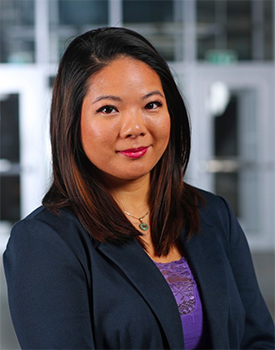They are usually older, tend to be women, are often living with dementia and are increasingly being taken to emergency rooms by family members or friends having trouble caring for them.
They are given different labels in emergency departments around the globe — alternately, orphan patients, social admissions, community emergencies, and people who fail to cope or fail to thrive — but they share a similar profile. They are not suffering acute medical issues, but are ending up in hospitals because caregivers are struggling to provide for them at home or access services in the community.
It is a phenomenon that has been on the rise for years, particularly since the start of the pandemic in 2020. The numbers also tend to spike around the holidays when families are stretched, exhausted and possibly seeing their elderly relatives for the first time in a while, experts have found.
 Dr. Jasmine Mah (pictured), an internal medicine resident and PhD candidate at Dalhousie, is leading a study examining the issue that affects health-care providers in hospitals around the world, but one that hasn't been widely researched.
Dr. Jasmine Mah (pictured), an internal medicine resident and PhD candidate at Dalhousie, is leading a study examining the issue that affects health-care providers in hospitals around the world, but one that hasn't been widely researched.
"Every physician knows this patient exists — the so-called ‘social admission,’" says Dr. Mah, who specializes in caring for older adults as part of the Geriatric Medicine Research group.
"My team and I am looking at how do we better care for this patient population. My research looks at social vulnerability — the non-medical reasons people need health care. Imagine you have nowhere else to go except hospital — there are few people more socially vulnerable than these individuals."
Understanding the issues
Dr. Mah and colleagues have interviewed health-care workers and administrators about the cases at a Halifax hospital, and are also speaking with patients and their families about how they ended up in emergency departments and what might be done in the community to prevent that.
They have discovered that the number of these types of admissions has more than tripled since the pandemic was declared. During that time, Halifax hospitals have reported one to two cases a week on average, compared to three in all of 2010. In 2021, hospitals recorded 109 cases and are now on track for a record 120 cases this year.
They are finding that some people are being taken to emergency rooms because their families are having trouble accessing community services and resources for their loved ones, many of whom can end up staying in hospitals for prolonged periods of time while they wait for a spot in a long-term care home or access to specialized care.
One hospital worker described to Dr. Mah how some orphan patients end up in specialized units where they don't need to be.
"The patients who are waiting for a nursing home or a group home, or are homeless, this is actually increasingly something we're seeing with orphan patients," the worker said. "They are just people who sit on our unit, sometimes for months, while social workers try in vain to find a place for people to go."
Social admissions
Dr. Mah, who has been studying social admissions since 2017, explains that some of these patients have few physical ailments and may just need someone to spend time talking to them, providing recreational therapy, or physical and occupational therapy. In some cases, it can be difficult to access these kinds of services once they are in hospital, leading to lengthy admissions and patients becoming deconditioned. Previous studies have found that patients who go in for non-medical causes are at risk of dying in hospital or soon after they are discharged.
Dr. Mah says that while the absolute numbers of long-term social admissions are small at less than 1 per cent, they constitute about 3.6 per cent of bed days.
"Once they're in hospital, we may need services like physiotherapy, occupational therapy, cognitive assessments, social work and Continuing Care expertise to get them back home," she says.
Her research also suggests that older people who arrive at the emergency department may be deemed orphan patients despite their health status and whether they are sick. Dr. Mah says ageism and bias can influence how patients are labelled, but suggests caution as some do have medical issues. For example, a proportion of patients under this umbrella term have chronic mental health challenges and there are few easily accessible services to meet their needs.
There are also patients who are confused or have dementia. “They may not need the help hospitals have been equipped to provide, but they do need help from someone who could make their meals, for example,” says Dr. Mah.
"Emergency departments used to be the safety net of community care, but lately they have become community care because of the lack of resources in the community. If we truly want acute care to focus on acute care, then we have to provide alternate systems and services for these individuals who are not acutely unwell."

